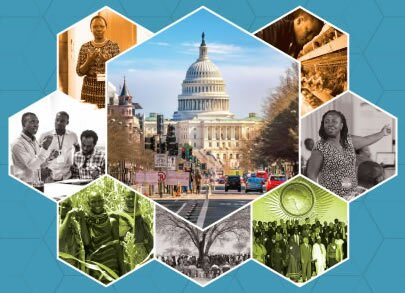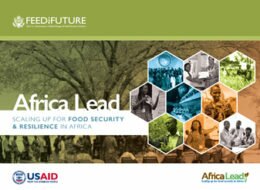
Africa Lead Capstone Learning Event

ABOUT THE EVENT
Convened in partnership with Feed the Future and the African Union, Africa Lead hosted an all-day learning event on October 29, 2019 at the National Press Club in Washington, D.C.
The capstone event in Africa Lead’s Final Program Year Learning Series, brought together key African leaders, non-state actors, governments, and the private sector to reflect on six years of programming advancing food security and resilience policy efforts across Africa.
Throughout the event, panelists and audience members reflected on how Africa Lead’s unique approaches strengthened the capacity and commitment of leaders and institutions driving Africa’s agricultural transformation into the future.
The opening session will feature remarks from USAID and the African Union Commission to set the scene for engaging discussions focused on experiences, lessons and approaches to developing national capacity for agricultural transformation in Africa.

In advance of Africa Lead II’s Final Report, to be submitted in December 2019, Africa Lead made available to event participants an initial summary review of the program.


What are the hard facts about the soft art of facilitative leadership? How can a more facilitative approach help build leadership capacity and momentum for policy change and agricultural development in Africa? This session will explore how Africa Lead’s approach to facilitative leadership applies to food security policy and agricultural transformation.

Magreth has extensive experience facilitating multi-stakeholder processes for building consensus on policy and institutional change. She is also a trained Africa Lead trainer and has multiple years of experience delivering Africa Lead’s Champions for Change training program.

A graduate of Africa Lead’s new Executive Leadership Course for Food Security, George will share his perspective on how well designed leadership training is making a big difference for him as a CGIAR manager and how these approaches can be scaled.

A leading advocate for youth in agribusiness from Nigeria, John is an inspirational youth speaker, former Africa Lead Champion for Change and a young professional and will share trends and ideas for building the capacity of the next generation of agricultural policy leaders in Africa.

Jeff recently served as the head of Economic Growth at USAID/South Sudan. He brings deep experience working on community-based planning initiatives within the resilience context. Prior to his post in South Sudan, Jeff collaborated closely with the African Union on CAADP and was one of the original designers of Africa Lead phase I and II.

Aliou will share experience and lessons learned from Africa Lead’s portfolio in Senegal, which includes efforts to scale and institutionalize the Africa Lead Champions for Change curriculum with six major universities in West Africa (Ghana, Nigeria, and Senegal) which have adopted training curriculum reaching over 600 students to date.
What have we learned about how governments can work collaboratively with Non-State Actors to deliver on ambitious agricultural development projects?

ActionAid has partnered with several civil society organizations to develop the Value Addition Biennial Review (VAB) Toolkit as a compliment to the AUC’s Agricultural Transformation Scorecard. As one of the key thought leaders piloting the VAB Toolkit, Constance will reflect on the perspectives of Non-State Actors and their increasingly important but often under-appreciated role in national and regional agricultural development processes.

The CNCR is Senegal’s national, apex-level NSA organization that coordinates the Groupe de Dialogue Social et Politique, a non-state actor group with the mandate to improve participation by NSAs in the implementation of CAADP in Senegal. As a member of CNCR, Ibrahima will reflect on the perspectives of Non State Actors and their increasingly important but often under-appreciated role in national and regional agricultural development processes.

As a thought leader in this space, David will share some USAID perspectives and raise questions on collaborative governance and lessons learned for addressing political economy issues.

Rick is a thought leader with deep experience in supporting collaborative governance efforts, in particular with a focus on organizational and institutional strengthening. He will reflect on his global experience and share lessons learned on collaborations between the public and private sectors, as well as civil society.
Is there a method to the madness we often see? Africa Lead has gathered, a panel of experts who will talk about real experiences with Joint Planning and Implementation processes

Dorine has extensive experience designing and supporting the Partnership for Resilience and Economic Growth (PREG) in the arid and semi arid regions of Kenya. She will share her perspectives and insights from this collective planning and implementation initiative.

Ernest is the former Permanent, Secretary of Agriculture in Rwanda and recently served as the Senior Advisor to the Commissioner of AU DREA and Head of CAADP at African Union. Experiences and lessons on Joint Planning & Implementation at different levels (National, Regional & Continental)

As a member of the Partnership for Resilience and Economic Growth in Kenya, NDMA has played a critical role as the government counterpart for resilience efforts at local and national levels in Kenya. Paul will share his experience collaborating with a variety of stakeholders through the partnership, and how this has supported and strengthened NDMA’s mandate.

As a thought leader in community based planning approaches, Daniel will share his experiences and lessons from the Partnership for Recovery and Resilience (PfRR) in South Sudan.

As Director at APIX Investment Promotion Agency, Mamadou Lamine provides support for investors interested in doing business in Senegal and regularly publishes resources for investors and partners. He is responsible for the implementation of Regional Investment Platforms in targeted cities of Senegal, a project supported by Africa Lead and later the World Bank.
In partnership with African counterparts, Africa Lead has supported several adaptive management, learning and accountability systems — including the CAADP Biennial Review, a dynamic dashboard to monitor the implementation of Senegal’s national development plan, and the Joint Sector Review as a platform for adaptive management and continuous learning. What early lessons can we glean about these tools and how they are influencing country policies, or not!

As M&E officer for the ECOWAS Regional Agricultural Policy, Fatmata will offer unique perspectives and insights on using data for adaptive management purposes and policy learning from a Regional Intergovernmental Organization perspective.

Augustine has 19 years experience working on African agricultural development issues, including signification work on CAADP. He’ll share his perspective on how CAADP can encourage and support adaptive management and policy learning through the Joint Sector Reviews and Biennial Review processes.

As the ReSAKSS Coordinator at IFPRI, John Ulimwengu is involved in research and policy advisory work for CAADP implementation. He will share his perspective on how the Joint Sector Review and other data-driven research and assessment work can support policy learning and improve outcomes at the national and continental level.

Edwin will share his experiences leading and managing Africa Lead’s unique regional pilot activity to facilitate learning and continuous improve in the East African seed sector, in particular focusing on the role of the private sector in this type of learning network.

As the Head of the Policy Team at BFS, Chris will share some USAID perspectives on the topic of using data to drive adaptive management and policy learning across Africa and specifically under CAADP.e
Africa Lead is Feed the Future’s primary capacity building program in sub Saharan Africa. Feed the Future (FTF) is the U.S. Government’s global hunger and food security initiative.
The program works to help realize FTF's and the African Union’s Comprehensive Africa Agriculture Development Program (CAADP) goals of reduced hunger and poverty by building the capacity of champions, institutions and stakeholders to develop, lead and manage the structures needed for African-led agriculture transformation.